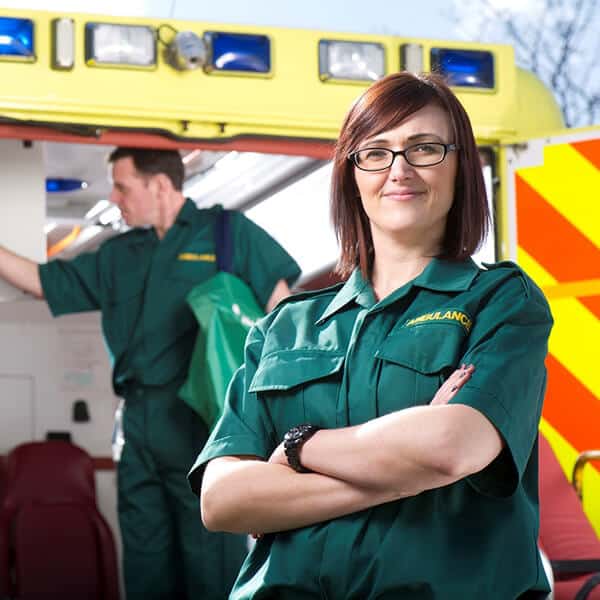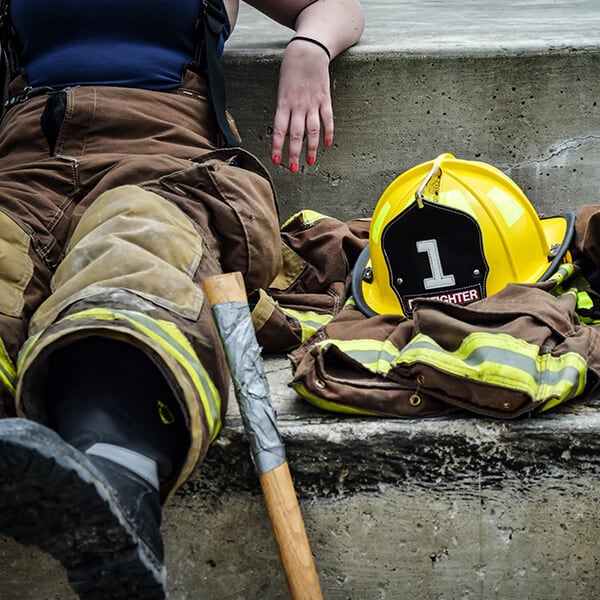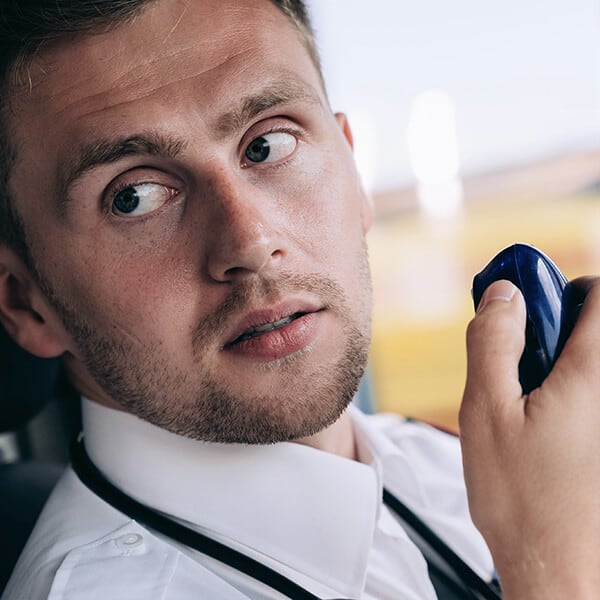Therapy for First Responders and Front Line Professionals
You're tired of wearing burnout as a badge of honour.
It doesn't have to be this way.
You find yourself in high stake, high stress emergency environments every single day. You’ll see and experience a lot during your career. It’s not always easy to know what to do with the thoughts, feelings and memories that come with the territory. You may even feel that you have nowhere to turn to when you need to process these things, leading you to try and suppress your emotions and thoughts – hardly the ingredients to a long, successful and stable career.
For all that you do for us, you deserve the best care and support.
That’s why we’ve created a space for you, our society’s heroes. At YTherapy, we’re here to help you so you can continue to help those who need it the most.
Individual 1-to-1 Counselling for Emergency Responders
Asking for help is one of the biggest steps you can take as an individual. And we’re ready when you’re ready.
Find joy in your work again. Express your thoughts and feelings in a safe space, and get back to feeling like you again.
Team Wide Mental Health Support for Emergency Responders
As part of your duty of care, you may want to implement professional mental health support as part of your EAP.
We’ll be more than happy to help you and your team to get back on your feet, stronger and more resilient than ever.
Accepting help isn't always easy.
Whether you’re a front line health worker, firefighter, police officer or prison officer, you’ve made a commitment to helping people in need and keeping our community safe.
It can be hard asking for, and accepting support when you’re the one tasked with helping others.
But what about what you need?
Common mental health challenges in first responders may look like:
- Worrying about, or feeling responsible for things outside your control
- Experiencing flashbacks or replaying certain incidents over and over again
- Having frequent, intrusive, and potentially disturbing thoughts
- Feeling jumpy, agitated or ‘triggered’ by certain sounds, movements, places or situations

These feelings don’t have to be something that ‘just come with the job.’
Like any other workplace, if your mental health is impacting your ability to enjoy your job –
It’s time to take action.
Therapy Services for First Responders
If your mental health is being impacted by the things you see, hear and do as part of your job, it’s important to know that you’re not alone. Counselling can help.
YTherapy offers a range of mental health support for emergency services staff.
Working together, we’ll look at how you’re personally impacted and how you’re coping. With our mind & body approach to mental health and wellness, we’ll help you get to the root of your challenges and equip you with tools to build your resilience.

Anxiety Therapy for First Responders
Working in the emergency services, you’ll know how it feels to manage adrenaline. In fact, it’s one of the things that helps you do your job well. But if you find that your worrying is starting to impact your life both in and outside work, you may be dealing with anxiety.
During anxiety therapy, we’ll take a closer look at the things that are causing your anxiety. We’ll then work together to give you the tools to take back control and move forward positively through your life.
Signs and symptoms of anxiety in the emergency services may include:
- Feeling persistently on edge, even away from work
- Becoming tired more easily
- Experiencing ‘brain fog’ or having difficulty concentrating
- Becoming more irritable
- Suffering with tense muscles
- Overwhelming feelings of worry
- Having sleep problems; difficulty falling or staying asleep, restlessness or still feeling tired when you wake up
Stress and Burnout Therapy for First Responders
For anyone working in the emergency services, achieving a healthy work-life balance can be challenging. However, not addressing this balance can lead to serious stress responses, and even burnout.
After all, how can you be expected to look after someone when you don’t have time to look after yourself?
With the support of stress and burnout therapy, we’ll take a deeper look at the main sources of stress in your life, help you to establish healthy boundaries and equip you with a robust set of mindset tools to better cope with stress and crisis.

Common stress and burnout causes in the emergency services may include:
- Anti-social shift patterns that keep you from family and friends
- Extra shifts to help with staff shortages
- Working weekends and holidays
- Restrictions of being on-call
- Working overtime at short notice
- The inability to ‘leave work at work’

Trauma Therapy for First Responders
As humans, we all experience emotional reactions to certain events in our lives. But when these reactions start becoming debilitating, it may be a post-traumatic stress response.
We use trauma therapy for first responders to help you or your team process trauma specific to your working life.
This may be direct trauma – you’ve been directly involved in a traumatic event or incident. Or it may be indirect (or vicarious) trauma – you’ve experienced traumatic events through other people. For example, you may work in emergency services contact centres or in content moderation. Either way, it’s tough. And you deserve help.
Emergency services or front line worker trauma and PTSD may include:
- Witnessing or directly experiencing aggression, assaults or attacks at work
- Seeing people in a powerless state and feeling unable to help
- Hearing accounts from traumatised victims and survivors
- Intervening and playing an active role in stopping aggression or violence
- Experiencing significant incidents including violence and death
Secondary Trauma or Vicarious Trauma Therapy for First Responders
You’re the person who sees the worst things people can go through on a daily basis. You may not be the one directly living these experiences, but you’re living them through someone else.
Overtime, it can start to feel exhausting. It may even result in you feeling dread over going to work. But just because you’re feeling discouraged with work right now, it doesn’t necessarily mean you hate your job. It’s much more likely that you’re experiencing ‘compassion fatigue’.
We can help you here. Through attending counselling, you can begin to enjoy your job as a helping professional again.

Signs and symptoms of vicarious trauma in emergency responders may include:
- Your outlook has become a lot more pessimistic
- Feeling dread at the prospect of going to work
- Becoming overwhelmed easily
- Seeing a drop in productivity
- Your job doesn’t feel fun or exciting anymore
- Feeling as though you’re simply ‘going through the motions’
Start Your First Responder Therapy Journey
We’ll be here for you when you’re ready.
Simply follow these three easy steps to start your journey to a brighter, more resilient future.
- 1 -
Schedule Your Free Phone Consultation
Schedule a free 20 minute consultation and connect with one of our therapists.
- 2 -
Begin Counselling in London or Online
Work with a fully qualified and experienced therapist in anxiety, burnout and trauma.
- 3 -
Bounce Back Stronger and More Resilient
Become your very best self and continue making a difference in people’s lives.
Our Mental Health and Wellness Services at YTherapy
At YTherapy, we offer comprehensive mental health and wellness support for helping professionals, including therapy for anxiety, burnout and trauma, with both in-person counselling in London and online therapy options available. In addition to our private 1-to-1 psychotherapy services for individuals, we provide vicarious trauma support for organisations whose employees are exposed to trauma as part of their work. This includes EAP counselling services specialising in burnout and vicarious trauma. We also offer bespoke corporate wellness services, including vicarious trauma training, clinical supervision and reflective practice groups – all tailored for organisations in sectors such as first responder emergency services, healthcare & social care, legal and wellness.
If you’re looking for support for yourself or a colleague, or if you’re seeking to develop a trauma-informed and resilient workforce, please feel free to get in touch by booking a consultation to discuss your needs, or by emailing your enquiry in confidence: hello@ytherapy.com
